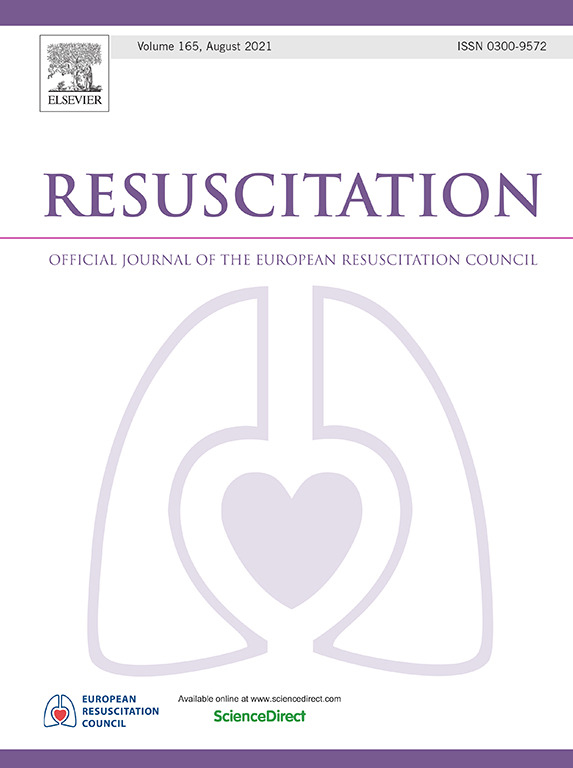院外心脏骤停患者的存活率与除颤尝试次数的关系。
IF 4.6
1区 医学
Q1 CRITICAL CARE MEDICINE
引用次数: 0
摘要
导言/目的:院外心脏骤停(OHCA)伴有对除颤无反应的可电击无脉搏室速或室颤是一项医学挑战。针对三次或三次以上除颤无效的所谓难治性室颤,已经出现了一些新的治疗策略,但有关这些策略的最佳时机的证据却很稀少。这项观察性研究的主要目的是评估与 OHCA 除颤总数相关的存活率:这是一项以登记为基础的回顾性队列研究,基于急救医疗服务机构向瑞典心肺复苏登记处和国家患者登记处报告的数据。研究纳入了 2010 年 1 月 1 日至 2020 年 12 月 31 日期间瑞典所有年龄在 18 岁或 18 岁以上、初始可电击心律的 OHCA 患者。暴露是除颤的总次数,主要结果是30天内的存活率。采用逻辑回归调整患者和复苏特征:研究期间共纳入了 10,549 名患者。其中,3,006 人(28.5%)只接受了一次电击,1,665 人(15.8%)接受了两次电击,1,336 人(12.9%)接受了三次电击,1,064 人(10.1%)接受了四次电击,3,478 人(33.0%)接受了五次或五次以上电击。在调整后的分析中发现,每增加一次除颤,患者的 30 天存活率就会呈指数下降。接受一次、两次、三次和四次除颤的患者,调整后的存活概率分别为42%、36%、30%和25%:在这项以登记为基础的回顾性队列研究中,额外除颤与较低的存活率有关。在对患者和复苏特征进行调整后,这种关联依然存在。本文章由计算机程序翻译,如有差异,请以英文原文为准。
Survival in relation to number of defibrillation attempts in out-of-hospital cardiac arrest
Introduction/aim
Out-of-hospital cardiac arrest (OHCA) with shockable pulseless ventricular tachycardia or fibrillation not responding to defibrillation is a medical challenge. Novel treatment strategies have emerged for so-called refractory ventricular fibrillation not responding to three or more defibrillations but the evidence for optimal timing for these strategies is sparse. The primary aim of this observational study was to assess survival in relation to total numbers of defibrillations in OHCA.
Methods
This is a registry-based retrospective cohort study based on data reported by the emergency medical services to the Swedish Registry of Cardiopulmonary Resuscitation and the National Patient Registry. All OHCA patients aged 18 years or older with an initial shockable rhythm in Sweden from January 1, 2010 and December 31, 2020 were included. Exposure was total number of defibrillations, and primary outcome was survival to 30 days. Logistic regression was used to adjust for patient and resuscitation characteristics.
Results
Over the study period a total of 10,549 patients were included. Among them, 3,006 (28.5%) received only one shock, 1,665 (15.8%) two shocks, 1,336 (12.9%) three shocks, 1,064 (10.1%) four shocks and 3,478 (33.0%) five or more shocks. In the adjusted analysis an exponential decrease in the 30-day survival was found for each additional defibrillation. For patients receiving one, two, three and four defibrillations, the adjusted probability of survival was 42%, 36%, 30% and 25% respectively.
Conclusions
In this registry-based retrospective cohort study, additional defibrillations were associated with a lower survival. This association persisted after adjustments for patient and resuscitation characteristics.
求助全文
通过发布文献求助,成功后即可免费获取论文全文。
去求助
来源期刊

Resuscitation
医学-急救医学
CiteScore
12.00
自引率
18.50%
发文量
556
审稿时长
21 days
期刊介绍:
Resuscitation is a monthly international and interdisciplinary medical journal. The papers published deal with the aetiology, pathophysiology and prevention of cardiac arrest, resuscitation training, clinical resuscitation, and experimental resuscitation research, although papers relating to animal studies will be published only if they are of exceptional interest and related directly to clinical cardiopulmonary resuscitation. Papers relating to trauma are published occasionally but the majority of these concern traumatic cardiac arrest.
 求助内容:
求助内容: 应助结果提醒方式:
应助结果提醒方式:


